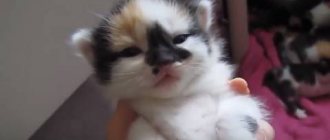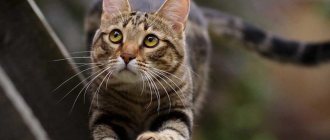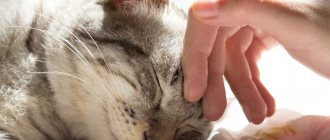Why does a domestic cat growl?
Every cat owner will agree that these creatures have their own character, their own mood, emotions, and even their own body language (you can learn how to learn to understand your cat without words here). Therefore, it is not surprising that what we express in words, an animal can express in ways available to it, including... growling. Yes, yes, domestic cats, our kind and affectionate ones, can sometimes growl quite menacingly, reminding us of who their ancestors were. And today we invite you to find out why and in what situations a cat can growl, how to wean it from such a habit, and how to behave when your cat growls at you...
Why does a pet suddenly become aggressive and attack its owners?
Most often, aggressive behavior is not a pathological deviation, but a consequence of the emotional state of the animal
It is necessary not only to pay attention to the immediate circumstances that led to the manifestation of hostility, but also to look for reasons in the environment, in previous events, in the cat’s past. Patient observation of your pet will help you find triggers and take measures to eliminate them.
Reaction to pain and ill health
Pain is the most common cause of sudden aggression, especially in older or restless cats. Arthritis, dental disease, injury or infection are just some of the reasons that can cause aggressive behavior. In this case, the attack occurs not only after touching, but also when the suffering pet tries to prevent possible painful contact.
Other physiological conditions also lead to aggression. Cognitive decline, loss of normal sensory perception (hearing, vision, smell) or neurological problems distort instinctive mechanisms for recognizing danger.
Sudden fear or prolonged stress
Aggression can occur in a situation where the cat feels threatened or trapped. The fight-or-flight reflex involves the sympathetic nervous system: if there is nowhere to run, the only option is to fight. Having instantly mobilized all its physical capabilities, the cat rushes to attack, and therefore such cases are especially dangerous.
Long-term stress in cats is caused by both excessive attention and neglect on the part of the owner or mistress. Not all representatives of this genus can tolerate endless affection and contact with people
“Loved” pets are in a state of stress and can react with spontaneous hostility to violation of their personal space. Parting with the owner or limiting contact with him can also provoke outbursts of rage, the purpose of which is to attract attention to oneself.
Unpleasant changes: a new smell, rearrangement of furniture, appearance of a competitor
Adaptation to new conditions is another stress factor for a cat. The aggression that arises in connection with this is called status aggression. It may arise if the owner decides to move the pet to another room, change the feeding place, or introduce new rules of the hostel. Jealousy towards other pets can also cause sudden outbursts.
Redirected aggression occurs when a cat is scared or upset, but instead of going after the true object of concern, it turns its anger towards an easy target. To relieve excitement from an external and inaccessible stimulus - unpleasant noise, smell, game, competitors, she rushes at any person nearby.
Fight for freedom, food and territory
A pronounced sense of ownership is found in both females and males. This type of behavior, unlike normal and temporary maternal aggression, can create problems. The target of an attack can be not only animals or unfamiliar visitors, but also the owners themselves. For example, it is often said that a mustachioed villain attacked one of the family members after he was forced to sit behind a closed door. There are cases when an irritated pet deliberately bites its owner, who is trying to intervene in his conflict with competitors.
Many cats, deprived of human contact at an early age, perceive their presence as a threat and use their claws and teeth to put the “enemy” to flight. While on its territory, the unsociable predator bites and scratches the alien and calms down only after it manages to drive him away.
Territorial aggression
It occurs in both females and males upon the onset of puberty. A cat and its entire pride (people and other pets) have a certain smell and place in the hierarchy. If one of the members of the pack crosses the “permissible boundaries” or changes the smell, the former friend turns into a “stranger” who must leave the territory.
Attacks on the owner can be explained by competition for the place of alpha representative in the pack. A person has a personal scent - the smell of sweat, in men it is saturated with testosterone, in women with estrogen. The smell of sweat causes aggression in a cat due to the action of the sexual instinct; a cat attacks a man, a cat attacks a woman. If the animal and the owner are of different sexes, the smell of human sweat causes the opposite reaction - sexual arousal and the release of endorphins.
Protecting the territory is dictated by the instinct of reproduction, and aggression in a cat can only be removed by sterilizing the pet. Please note that the older the ward becomes, the weaker he considers himself, and the fear of being overthrown or expelled prompts the animal to become violently aggressive.
We invite you to read: A tumor has appeared on the mammary gland - how to help your pet?
Hissing as an expression of dissatisfaction and readiness to attack
The ability to see the reasons for a negative reaction and predict further actions underlies the problem-free coexistence of a person and a freedom-loving cat in the same territory. In order not to aggravate the conflict with the hissing cat, it is strongly recommended not to:
- Imposing your company on the cat and pestering it with food or toys. A pet who is in a bad mood has no time for entertainment, and his appetite at such moments noticeably worsens.
- Try to calm the cat by stroking it. At the moment of inflated feelings, a pet may react inappropriately to an outstretched hand, hitting with a clawed paw and leaving a bloody trail.
- Take the cat in your arms and cuddle it. Most likely, such an attempt will immediately fail, and the angry or frightened cat will become even more furious. Some pets may freeze for a moment in the owner’s hands, but then begin to break free with renewed vigor, dodging and using their teeth and claws.
- Block the animal's escape route. The running cat defiantly asks to be left alone. But if the owner is persistent and begins to chase the animal or tries to detain it, he will certainly cause an outbreak of aggression.
- Trying to get the cat out of hiding. A cat's house is an inviolable personal space, so there should be no intrusion from the outside. An animal huddled in a nook is in a state of stress and seeks salvation in an accessible shelter, and if it tries to bother you, it will most likely launch a serious attack.
How to calm your cat and avoid aggressive pet behavior
Learning to manage your cat's aggression is quite simple. You just have to correctly recognize the signals it sends to you. And as a result, withdraw yourself from playing with your pet before she enters a state of angry aggression. Have you noticed nervous twitching of the tail and ears pressed to the head? Remove your hand, leave the cat alone, sometimes changing the intonation helps to cool down an aggressive attack. If you haven’t assessed the degree of danger, get ready for bloody scratches on your hands and feet.
In order for a pet not to be too aggressive, it must be raised from childhood with love and affection, without pain and violence.
If you happen to bring a new animal into your home, isolate it for several days in a closed room, let the furry pet calmly look around and get used to the new smells. This trick will help you avoid developing fear and panic.
If you have adopted a small kitten into your family, then nurture its character from childhood, instilling in it balance and tolerance. Stop all attacks of aggression from infancy, be affectionate and friendly, and then you will definitely succeed in raising an adequate animal.
But we shouldn’t forget that it doesn’t make any sense to fight cat aggressiveness until it completely disappears, this is how these animals are designed by nature itself.
If a kitten constantly feels danger and fear, then this might grow out of it!
If you find an error, please highlight a piece of text and press Ctrl Enter.
Alien smell
Changing the smell of kittens, as a result of our indiscretion in handling babies, can disturb the cat and cause an aggressive reaction in it. A person, holding a kitten in his hands for just a little while, changes its smell. The mother may not recognize him and may even growl at him in order to drive him away. However, as a rule, the mother licks the kitten to return its characteristic smell.
If the cat hisses at the kitten and does not want to accept him, you need to try to return him to the smell familiar to his mother. To do this you can
:
- wrap it in your mattress for a while;
- put next to the rest of the kittens;
- rub his fur with mom’s toy.
After some time, the kitten will get rid of the foreign smell and the cat will stop hissing at him and recognize the cub. But it is possible that the mother will reject the baby because of the foreign smell, as if he is not from her offspring. For this reason, it is not recommended to handle small kittens.
Being in a team
If a cat does not like to be in large crowds of people, play with children or roam from hand to hand, it is better to isolate it in the next room. Some animals simply cannot stand large companies and warn not to be touched by growling.
You should not pick up the animal, stroke it, or allow children to play with it, since the cat can also warn of an attack, and its hissing or growling can very soon turn into scratching.
Hissing at other animals
Most often, a cat's hiss is a protective signal or a warning of danger. At this time, the animal becomes tense and takes a corresponding position: the back arches, the fur stands on end, and the cat is ready to attack the enemy if something happens. The cat also bares its teeth and shows its rather sharp teeth. Her eyes become rounded and her pupils narrow. This shows how excited she is.
The cat becomes quite bold, decisive and ready for a possible attack. Its last warning is a meow and a loud hiss, which warns the enemy that it is ready to attack. The owner needs to figure it out and understand what caused this in order to protect himself from bites and scratches.
Almost all cats are considered loners by nature. Even living in a house with their owners, they want to feel their independence. Therefore, the appearance of another animal in the house immediately leads to a defensive reaction - hissing, growling and other manifestations of dissatisfaction. This lasts until the “cohabitants” come to terms with each other’s existence and divide the territory among themselves.
Cats are the most angry at dogs. This is another instinct that you can’t get rid of so easily. Even if the dog is somewhere far away, the cat will hiss, scaring the animal away and not allowing it into its territory.
If a dog and a cat are forced to live in the same yard or apartment, over time the relationship between them will improve. The owners can also help them with this. To do this, they must give the same amount of attention to all pets.
A cat's hiss is a communication signal, just like meowing, growling, or other nonverbal signs (ear pinching or tail twitching). By hissing, the cat is trying to communicate discomfort: this can be both a manifestation of illness and a manifestation of stress. Be that as it may, hissing is an emotional signal that indicates the internal (physical or psychological) distress of the animal.
A cat hissing is a sign of internal discomfort
In some cases, a cat hisses because it is inherent in its breed. Let's say Siamese hiss due to the inherent behavior of this type of temperament. Some active breeds start to hiss because they don't get enough exercise. These are Abyssinian, Oriental, Cornish Rex and some others.
How to stop an animal from growling
If growling and aggressive behavior are inherent in the character of a cat, then it is unlikely to be weaned from it. However, if the reason lies elsewhere, then it should simply be eliminated. If you cannot do this yourself, you need to seek help from a specialist.
Important: you should not shout at the cat or humiliate it, much less hit it; this may not have the effect you expect, and the pet will become even more aggressive.
The cat is in pain or preparing for it
If a terry pet hisses at the owner for no reason, there is a possibility that the cat is sick. Or maybe he seems to be very worried, because it is difficult to explain why a cat hisses for no reason. A meowing friend may have a number of medical conditions that cause irritation, for example:
- epilepsy;
- severe poisoning;
- hormonal changes occur in the cat’s body;
- the cat was injured;
- the animal has developed toxoplasmosis or other iatrogenic disease.
When an animal is sick, it is afraid of a person; it even cries at the touch of its owner. It does not want to be in trouble and is afraid that the owner will cause pain without wanting it.
Unmet cat needs
Human-raised cats may hiss when their needs are not met.
Hissing begins when the owner is in no hurry to fulfill some cat's whim. For example, a cat in the kitchen is waiting for the bowl to be filled with food, but the owner is in no hurry. Then the plaintive meow turns into a menacing hiss. Or the kitty curls around the owner's legs in every possible way, waiting for the owner to stroke it, while he is busy with something else. Then the sweet and kind creature turns into an irritated hissing fury. In similar situations, you can’t do anything, because the cat behaves this way due to lack of good upbringing.
Leadership in the cat family
When kittens switch to adult food and learn to defend themselves, they become independent and enter adulthood.
During this period, they cease to be cat children and become competitors for the attention of their owners, for the best tidbit, for territory. Hierarchy is very important in cats
When kittens switch to adult food, they become independent and enter adulthood.
By hissing, biting, and persecuting, the older cat asserts its dominance, the right to territory and the care of its owners.
At this age, it’s time to separate the cat and kittens and find a new home for the kittens. In special cases, you can try to endure and let them figure out for themselves who will be at what social level and themselves obey the subsequent rules established by the animals.
Possible reasons
There are several reasons why a cat may hiss at its owners, including a child. One of them is improper human behavior towards a kitten or adult cat. Since cats practically do not know how to show their feelings, they express them with various hisses. In some cases it can mean pain, in others it can mean simple irritation. Sometimes this shows the animal's fear, and sometimes it shows defense of its territory.
Aggression. It often happens that a beloved pet is angry with someone, but not with its owner. He cannot “yell” at a certain person or animal that offended him and throws out all his anger at his owner. This behavior is called psychological projection. Aggression can be projected onto everyone: both strangers and our own. Sometimes other animals also fall under the distribution. In such cases, it is best to isolate the cat for a while. In addition, you can show him to a specialist so that this behavior does not become permanent.
If it constantly hisses when a person simply walks past it, then this already becomes a problem that must be eliminated. The reason for this behavior may be that she was treated very poorly in her previous habitat. In this case, only affection can help. In addition, you will need to consult a specialist who will tell you how to handle such an animal in the future.
This means that this procedure gives her some discomfort or she simply doesn’t like it, and she begins to take action. It often happens that at this time she may even bite or scratch her owner.
In addition, it happens that your beloved pet is completely out of sorts. Therefore, even to affection, he can react with hissing and discontent. In this case, the cat is simply hinting that it wants to be alone.
Among other reasons, the following should be highlighted.
Stress. The cause of hissing may also be a stressful situation that occurred in the house where the pet lives. For example, the appearance of a new animal on its territory or a simple change in the daily routine. Even the usual rearrangement of furniture can be the root cause of this cat behavior. Indeed, at this moment the animals feel completely unprotected and helpless.
To attract attention. There are times when owners do not pay any attention to their charges. When all attempts to attract the owner have failed, the cat begins to hiss so that they show at least a little interest in it. If this works, then the animal may develop a corresponding reflex. Then she will hiss every time in such a situation.
Disease. When a cat feels any pain, it does not want to be touched. Therefore, in order to protect herself from any attention from humans, she makes such sounds. In this case, no one will want to approach her
The owner must pay attention to this and take his pet to a veterinary clinic, where the cat will be examined.
Frustration. This is a condition when the animal feels dissatisfied
Therefore, it may begin to hiss or growl for no reason at all. This can happen, for example, if a small kitten was separated from its mother cat early, being completely unprepared for this. Such an animal constantly feels defenseless and lost. That’s why he hisses, trying to somehow show his emotions.
Protecting your kids and territory. During pregnancy and after it, almost all animals have an instinct to protect little kittens from various dangers. They demonstrate their ability to protect their offspring by hissing and growling. In addition, any cat constantly defends its territory. And not just from other animals. They can even perceive a person as a predator. That's why they hiss at all sorts of suspicious individuals.
- Warning. Almost all domestic cats do not like to attack without reason, because they are very small compared to other animals. At the same time, they are not stupid and understand whether they can cope with the enemy or not. Therefore, with their hissing they warn all opponents that they are ready to attack. Even some dogs run away when this happens. It turns out that smart cats win without a fight.
- Sexual irritation. If a potential partner appears, hissing may indicate a willingness to actively fight for his female and protect her from the attacks of other animals. As for cats, they can also hiss in such a situation. But in their case it is rather “flirting”.
- Possible danger. In case of danger, a hissing cat can both warn its fellows about it and show that it can fight back in any case. In addition, the hissing is also accompanied by a loud growl.
Predator instinct
Everyone is familiar with the game when the owner plays with a kitten, moving his hand or foot under the blanket. It is at this moment that predatory behavior awakens. Only a person perceives this situation as a game, and the pet learns to hunt with all responsibility. This reason is easy to recognize:
- a cat attacks a person from an ambush;
- When you shout back at the cat, the pet begins to behave even more aggressively.
When this behavior goes too far, it becomes a problem.
INTERESTING TO KNOW: How to find out the age of a cat or kitten
"Hises like a snake"
Hissing is a very specific sound, eloquently indicating a strong negative reaction. A surge of irritation and negative emotions confirms the entire appearance of the animal:
- open mouth with demonstration of the entire combat set of teeth;
- burning eyes with dilated pupils;
- ears pressed to the head;
- an angry bristling mustache;
- raised wool.
Associated reactions. Depending on the degree of threat and personal temperament, the severity of the defensive reaction is not always the same, so a hissing cat may:
- At the next moment, quickly retreat, fleeing.
- Take a characteristic pose with an arched back and fluffy tail raised up, which means a more serious attitude and an attempt to intimidate the enemy.
- Apply several blows with a clawed paw, while grouping yourself and pressing your stomach to the ground, which symbolizes the intention to fight. The tail twitches nervously or whips from side to side.
Who is guilty. Dissatisfaction, fear and aggression, encrypted in hissing, can be directed both at a specific living object (a rival cat, a dog, a stranger) and “into space”, being initiated by a sudden loud sound or a flashing shadow. Regardless of the source, the cat's expression of displeasure, when further provoked, can develop into an attempt at violent self-defense and end in a harsh aggressive attack.
How to respond to a growl
Several rules will help relieve tension between you and your cat, the choice of which depends on the cause of the conflict:
- if aggression is associated with illness, take your pet to the clinic;
- when demonstrating a fighting spirit, wait 10–15 minutes until the pet calms down (it is better to go to another room during this time);
- after the cat has come to its senses, pet it, talk to it and treat it to something tasty;
- do not stop the cat from growling at your brood - this is one of the methods of education;
- if the cat’s fighting qualities are innate, just come to terms with this fact - you won’t influence the genes, so accept and love your bully for who he is.
Psychological reasons
The cat expresses the entire range of its emotions exclusively through body language, periodically supplementing it with several vocal variations available to it. There are few of them, but with their help the animal manages to convey to humans a huge number of experiences that need correct interpretation.
Predator instinct
It is embedded in every, even the most affectionate little cat, in whose veins the blood of distant forest ancestors flows. If you remind your cat of her hunting reflexes every day, don’t be surprised that over time she will turn into an angry, growling fury.
You have awakened a predator in your pet if it:
- jumps on your legs from ambush;
- does not respond to your shout, increasing the pressure;
- bites, hisses and scratches.
Correcting this behavior will be very difficult.
Social aggression
It occurs if a person annoys with excessive caresses. Any cat behaves quite coolly until it wants the owner’s tenderness.
She will come up to attract attention, will rub against her legs, caress, prop up her back or ask to be held
But tenderness (according to the cat) must be dosed - as soon as you overdo it with caresses, he will turn from an angel into a devil. At this moment, he is able to bite his hand, hiss and rattle his tail in displeasure, showing that the limit of his patience has been exhausted.
Frustration
This feline condition is akin to a human one and occurs when the pet’s desires do not coincide with its capabilities.
Feline frustration is recognized by the following actions:
- the pet hisses at the owner whom he trusts;
- growls, assuming that he did not get a treat;
- screams loudly and rushes about the threshold.
The cat becomes frustrated if the owner is slow to feed, is in no hurry to open the front door, or moves away somewhat from the pet.
Redirected aggression
A similar state can be experienced by cats that are frightened/angry by something in the presence of a particular person.
Thanks to excellent associative memory, a witness to an unpleasant incident turns into a source of negative memories for the cat.
Fear
A cat growls and hisses if it is fueled by fear due to insufficient socialization or, much worse, harassment and beatings (experienced from an early age).
If the growl is caused by fear, the markers of the latter will be:
- attacking people in the presence of a real/imaginary stimulus;
- growling, supplemented by paw swings;
- increased hissing/growling when the cat is cornered;
- clear warning postures;
- final accentuated licking of fur.
A cat whose fears originated in childhood needs increased attention and patience. She is not punished, but gently re-educated.
Resentment
This emotion is sometimes associated with fear, but often works autonomously. If a cat growls and hisses when it sees its owner, remember what caused the cat’s recent offense. The animal will ignore the offender or show its dissatisfaction openly, based on the severity of the offense. Talk to your pet so that the confrontation does not drag on, and be sure to sweeten your apology with a treat.
Domination
Once in the house, the animal will definitely build its own hierarchical scheme, headed by the leader: and it’s good if she chooses one of the household members, and not herself, to play the role of the latter. If a cat considers himself dominant in the family, he will immediately begin to prove his dominant role. Here he will come in handy with growls, hisses and claws, with the help of which he will repel all unauthorized attempts to enter his personal territory.
She must recognize someone from the family as the alpha male: but this lucky guy will not only be treated kindly, but will also feel the cat’s jealousy
The cat will try to be jealous of everyone who will enjoy his attention - relatives, friends, children and other domestic animals. Remember that cats have a hard time getting used to all the changes that occur in your family (departure, divorce, travel or the birth of babies)
Ownership instinct
In general, possessiveness stems from the desire to dominate. This instinct is inherent in cats at the genetic level, and besides, the instinct of ownership in cats is superior in the brightness of its manifestation to a similar instinct observed in humans. The cat growls and hisses, demonstrating that it is she who is the master of the situation at this moment, not letting you (for example) near her favorite toy or a bowl of food.
If you see that you are dealing with the instinct of the owner, do not aggravate the situation, but move away. Growling/hissing often signals a possible escalation of conflict: the audible warning will be followed by a confrontation (with bites and scratches).
Possessive instinct
A cat's instinct of ownership is much stronger than a human's. A pet can growl if it wants to show itself as the master of the situation. Even if the animal is the only one in the house, it is driven by this instinct at the genetic level.
To understand that it is precisely this reason that provokes the growl, just look at the circumstances under which the pet growls.
If he protects food or a favorite toy, it means that the possessive instinct has begun to play in him. What to do in this situation? First, you need to move away from the cat to a safe distance, since growling and hissing are the last warning before an attack. The cat may bite or scratch you.
Why do cats hiss at their kittens?
Photo: Cat growls and hisses at kitten | Dreamstime.com
- The cat hisses at the kittens so that they sit quietly in the nest.
It happens that a nursing cat is in danger, for example, when a strange dog runs close to her and her kittens. How to explain to stupid kids that they need to sit quietly without giving themselves away by loud meowing? Of course, with growls and hisses. The cat seems to be saying to the kittens: “Shhh, be quiet!”; - Hissing at kittens in some cases is a kind of lesson.
This is how a mother prepares her children for adulthood, in which they will have to face difficulties. Each kitten must learn to release its claws, growl, and hiss from its mother cat. In the process of such training, roars and hisses can be heard not only from the cat itself, but also from its children. A kitten hisses at an adult cat who is its mother? Perhaps this is the baby’s way of demonstrating that the lesson has been learned; - Sometimes a mother cat hisses at a little kitten if its smell seems foreign to her.
This happens when people take the baby away from the mother's nipples in order to communicate with him a little. It seems to us, people, that nothing bad will happen if we hold a tiny kitten in our hands for a minute or two. But the cat doesn’t think so; she can not only hiss at her kitten, which has acquired a foreign smell, but even refuse it; - It’s sad, but sometimes mother cats hiss at the weakest kittens in the litter, on whom it’s a pity to waste precious milk
. This is a kind of natural selection. And in some situations, cats even eat the most unviable babies; - Almost always, a cat hisses at her kittens and treats them quite hostilely if she is pregnant again
. The animal is preparing for childbirth and is accumulating strength for the birth of a new litter; there is no strength for already born babies; - A cat may hiss at a kitten while feeding
if it painfully bites the nipple with its sharp teeth. But sometimes quite old kittens aged 5-7 months (in fact, they are no longer kittens, but teenage cats) drink their mother’s milk! Mom is not angry with the grown-up kids, but warns that she is in pain; - A cat is also capable of hissing at its cub due to poor health.
So she seems to be asking the kitten to leave her alone for a while; - It happens that a cat hisses at a kitten due to lack of milk.
The cubs suck the nipple with all their might, causing discomfort to the mother, but milk still does not appear from this, but the cat feels noticeable discomfort; - Often, cats who were previously so affectionate to their kittens suddenly begin to hiss at them.
That's right: the children have grown up, and now the mother views them as competitors. Animals do not tend to take tender care of their adult children.
Injuries, illnesses
Your cat may look quite healthy, which does not at all exclude some diseases that are smoothed out or that arose not so long ago. Internal discomfort leads to unusual behavior, which is expressed, in particular, by unmotivated aggression.
This is interesting! If we are talking about illness, increased nervousness is often accompanied by refusal to eat/drink, apathy, frequent licking of fur and biting some parts of the body.
Tail biting
You may notice your pet trying to bite its tail and hear an angry hiss as it tries to prevent it. Sometimes the cat chews its tail at night, when everyone is lying down on the side.
The reasons for such a disorder can be various events:
- moving to a new apartment;
- birth of a baby;
- lack/decreased attention;
- other psychological trauma.
This kind of cat behavior must be stopped by getting to its source. Otherwise, the animal faces tail amputation.
Pregnancy
A cat growls and hisses when she is preparing to become a mother or immediately after giving birth to kittens, especially if a person has managed to undermine her trust. It will have to be restored, showing the pet that you will not hurt her or her offspring. As soon as the animal calms down, the aggressive attacks towards you will stop.
Anesthesia
A disruption in the cat’s usual behavior also occurs after undergoing general anesthesia . Animals have a hard time recovering from anesthesia and at this moment can behave very strangely, including hissing at their beloved owner. However, such a reaction is observed quite rarely, but no matter how the cat behaves, be there, stroke and calm it.
Return to content
Main causes of hissing
It is important to establish the cause of cat fear
For example, if you are introducing two animals to each other, make sure the introduction is done carefully and gradually. It is necessary to avoid mutual aggression and territorial claims of cats towards each other.
It is necessary to avoid mutual aggression and territorial claims of cats towards each other.
If your pet hisses every time you try to interact with him, make sure he is not in physical pain. Contact your veterinarian and, if your cat doesn't have any health problems, start working on her behavior and building her trust in you.
1. Recently rescued cats may hiss out of fear.
If you recently picked up an animal from the street or adopted it from a shelter, the cat may not be afraid of you specifically, but of people in general, as well as an unfamiliar home environment. How to help?
First, be patient and tactful. Communicate with your pet in a calm, even voice, do not create unnecessary noise and do not force the animal to come into contact with you. Second, show your cat where she can hide and feel safe. Third, purchase catnip or a calming spray from a pet store. They will help your cat cope with stress faster. However, remember that frequent use of mint causes addiction and a kind of dependence in pets.
2. Hissing may be a consequence of displaced aggression.
Displaced aggression occurs when a cat is unable to attack its immediate stimulus, so it hisses at its owner.
Redirect your pet's aggression into a peaceful direction - play. Throw or hide balls, attract the cat with feathered sticks or bells, and buy interactive toys. Don’t forget about the scratching post: it can also help the small predator “blow off steam.”
Eliminate or isolate the primary source of aggression. This could be any of a variety of things in your home. One has only to carefully observe the animal to understand which one it is.
3. The cat hisses at you because you are forcing her to do something she doesn't want to do.
Most often, the list of undesirable actions includes moving favorite pieces of furniture (for example, armchairs or chairs), trying to put the pet in a carrier, going to the veterinarian, or moving.
Get your cat used to the upcoming activity or event. For example, before taking your pet outside, take out the carrier in advance and place it near the pet. Let the cat get used to its sight and smell. Additionally, if you are planning a long trip together, you can take a short car ride around your area with your pet beforehand. Reward the cat for the work done: treat it with treats, play, pet it if it allows.
4. Cats may hiss at strangers.
Your cat may perceive unknown people as a source of threat to its life and territory. To avoid this situation, we suggest doing the following:
• Inform your guests in advance that your pet may be afraid of strangers. Ask them to keep their distance and not impose their company on the cat, and also try not to look directly into its eyes: animals regard this behavior as a challenge. At first, it is advisable for strangers to completely ignore the cat unless it comes up to sniff them.
If it seems to you that the pet is still friendly and ready to communicate, invite the guest to carefully extend his hand forward. For cats, sniffing a hand is the equivalent of meeting another pet nose to nose.
• Show your guests how much your cat loves to be petted. You can also teach them to play with your pet to earn its trust.
• Be casual: let your cat see that everything is fine and there is nothing to worry about.
Aggressiveness from fear
It happens when a cat that is quite friendly with others hisses at a certain person. This behavior is most often explained by fear and unpleasant memories of the first contact with him. For example, he inadvertently stepped on an animal’s paw or scared it in some other way. Perhaps this person is deliberately intimidating the four-legged animal, depriving it of the opportunity to retreat, trying to forcibly touch or pick it up. The cat perceives such actions as a direct threat, so it reacts aggressively - hissing.
The animal remembers once experienced stress for a long time. But the problem is easily eliminated with the help of kind words and favorite treats. The hissing of a pet can also be intuitive . If he was not handled as a child and had no human contact, the cat will probably be afraid of people as an adult. Even tamed cats can hiss at a person who is suspicious to them. That is, they proactively try to eliminate potential danger. That's why the cat hisses at strangers.
When strangers appear in the house, it is recommended to give the cat a treat, then he will associate such an event with pleasant experiences and will not hiss.
A pet may be frightened or wary of an unfamiliar noise that we have never heard, but it has excellent hearing. (He hears any rustling under the floor or behind the wall.) The cat hisses when he sees danger in a variety of situations :
- careless gesture of the owner;
- visiting a veterinarian;
- the appearance of an unfamiliar person or animal;
- strong sound or scream, etc.
When a cat hisses at its owner, there is no need to put pressure on him. – Do not pick him up or stroke him forcibly. Let him calm down first. However, this hissing is not necessarily an expression of aggressiveness; perhaps a frightened animal wants to be calmed down. Sometimes a pet feels threatened for no apparent reason. In this case, you need to distract the cat and try to calm it down. If she doesn't stop hissing for a long time, you should take her to the vet.
If a cat has hearing problems, she is constantly alert and easily frightened by the sudden appearance or touch of a person. This may also be the reason for her aggressive state.











